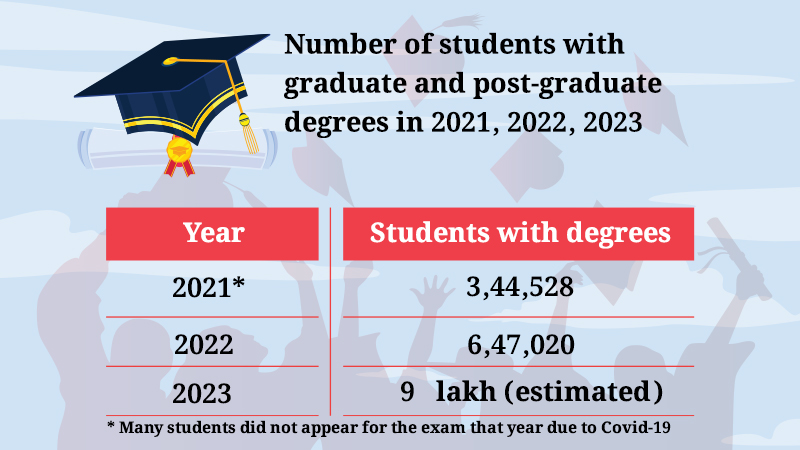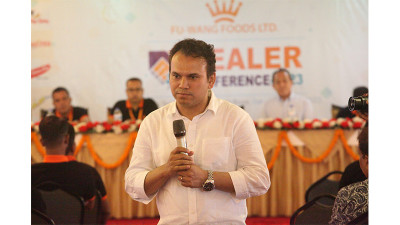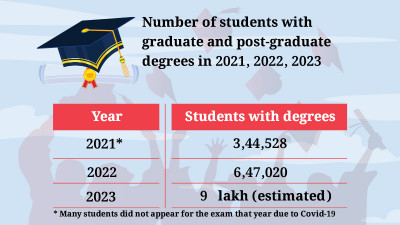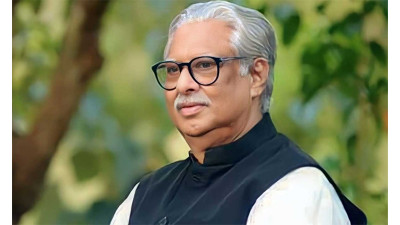 Photo: Bonik Barta
Photo: Bonik Barta Nearly
1.9 million students completed higher education from public and private
universities across the country over the past three years (2021-23). However,
the majority of these students remain unemployed. Some of these educated youth,
unable to secure jobs, are leading lives of extreme hardship. Experts warn that
if employment opportunities are not quickly created for this massive unemployed
population, they could become a significant burden for the country. Disappointed,
many may turn to deviant paths.
The
University Grants Commission (UGC) records the number of students graduating
from universities annually. According to UGC’s 2021 annual report, 344,528
students completed pass courses (three-year programs), bachelor’s (honors),
master’s, and postgraduate degrees that year. However, the number of graduates
was relatively low that year due to the COVID-19 pandemic. And in 2022, 647,620
students completed their graduation.
The
data collection process for the number of graduates in 2023 is still ongoing.
However, according to university reports, nearly 900,000 students earned higher
degrees last year. Altogether, over 1.89 million young students have earned
higher degrees from various universities in the past three years.
Accurate
data on the current employment status of these graduates is unavailable.
However, an analysis of surveys conducted by universities, various government
and private institutions, and organizations reveals that the majority of these
graduates have yet to enter the job market. Those who have secured jobs are
mostly employed in mid-level and private sector firms.
According
to data from the Bangladesh Labor Force Survey 2022, only 25.41 percent of the
country’s highly educated population is engaged in formal employment. Experts
say that the employment rate among recent graduates is even lower, with most of
them remaining unemployed. They attribute this steep decline in employment
among the educated population to a shrinking job market. Although the
industrial sector has expanded, job creation has lagged far behind.
Syed
Mahbubur Rahman, Managing Director of Mutual Trust Bank, believes the number of
unemployed has increased in recent years. He told Bonik Barta, “Instead of
creating new jobs, the job market has shrinked during this period. We’ve seen
large industries expand their factories but not increase their workforce. On
the contrary, industrial groups have laid off employees. We are not reaping any
benefits from the demographic dividend. Instead, the current unemployed youth
will become a significant burden for the country by 2050.”
Blaming
the education system for this unemployment crisis, this banker added, “There is
no shortage of job seekers, but there is a dearth of qualified workers. When we
sit on interview boards for hiring at banks, we see that even highly educated
youths struggle to communicate effectively or present themselves properly. The
current generation wants everything instantly, without any long-term goals. I
believe this reflects the failure of our education system.”
Typically,
jobs with legal protection and a structured framework fall under the formal
employment sector. According to data from the International Labour Organization
(ILO) in 2022, Bangladesh ranks seventh among the countries with the lowest
formal employment rates globally.
Private
sector entrepreneurs point out that while the government is creating more jobs
in the service sector, and the private sector is also expanding, there are
efforts to make young people more competent through various initiatives.
However, the challenge remains that every parent wants their child to have a
desk job, overlooking the fact that other types of jobs are also honorable.
Changing society’s mindset is crucial to resolving this issue.
Ardashir
Kabir, President of the Bangladesh Employers’ Federation (BEF), told Bonik
Barta, “Although we have made considerable economic progress, we are still
essentially a third-world country. As the world moves forward, we must enhance
our technological skills and usage to stay competitive with countries like
China, Vietnam, and Cambodia. We need to work closely with the private sector
to align with market demands and improve the quality of our students through
coordination with the National Skills Development Authority (NSDA). At the same
time, we must create job opportunities. If we fail to do so, social instability
will only increase.”
Currently,
a large portion of the country’s youth is chasing government jobs. In many
cases, job seekers are even applying for positions below their qualifications.
Moreover, various movements are emerging centered around government jobs.
Between last December and March, Bangladesh Railway hired 2,172 waymen in two
phases. The primary responsibility of this fourth-class (Grade 19) position is
to maintain the cleanliness of the railway tracks. Waymen also perform minor
maintenance tasks, such as tightening nuts and bolts on the tracks. The job is
labor-intensive, and the educational requirement is a secondary school
certificate (SSC) or equivalent. However, in the latest recruitment process,
everyone hired as a wayman holds a postgraduate degree.
It
is not only the railway; similar occurrences are happening in other government
jobs of this kind. Applicants say they prefer government jobs, even in lower
positions, due to uncertainty in the private sector. One such individual is
Shamim Islam (pseudonym), who completed his postgraduate degree in sociology
from a public university and joined the same university as an office
assistant-cum-computer operator. However, the educational requirement for this
Grade 16 position is much lower. According to the job notice, the post required
candidates to have only a higher secondary certificate (HSC).
Mamun
Rashid, Chairman of Financial Excellence Limited, a financial consulting firm,
told Bonik Barta, “Studies show that there is disguised unemployment in
Bangladesh. Even those who find jobs are often not employed in positions that
match their qualifications. Many graduates end up working in family businesses.
For these students, the institution they attended doesn’t matter as long as
they have a degree. Then, there’s another group that is only interested in the
BCS (Bangladesh Civil Service). Our biggest obstacle is the quality of
education. There’s no technical knowledge, no skill development, no hands-on
training. As a result, many are unable to perform quality work.”
According
to the 2022 annual report of the University Grants Commission (UGC), each year,
around 12,000 students graduate in Computer Science and Engineering (CSE) and
Information Technology (IT). However, the country’s IT industry hires only
about 5,000 people annually. This means that each year, more than double the
number of students graduate in these fields than there are job openings. Even
so, relevant institutions are not finding workers according to their needs.
This leads to a majority of graduates remaining unemployed for long periods due
to a lack of skills and experience.
Employers
in the job market complain that most students are graduating without even basic
coding skills. As a result, they are unable to hire CSE and IT graduates in the
required numbers despite demand. An observation by the Asian Development Bank
(ADB) also states that 80 percent of university graduates who pass these
courses fail the written exams for jobs in basic coding, English, and
mathematics.
When
asked, Fahim Mashroor, employment expert and co-founder and CEO of Bdjobs.com,
told Bonik Barta, “Higher education institutions are failing to produce quality
graduates. This is affecting not only the youth but also employment,
industries, and organizations. Often, we see graduates being considered
incompetent in the job market, even after completing undergraduate and
postgraduate degrees. Addressing this requires not only social awareness but
also an increase in institutional capabilities.”
However,
job seekers claim that due to the slow recruitment process for government jobs
and the fact that most private sector jobs demand experience, they remain
unemployed for long periods after completing their degrees or have to work for
very low wages.
Bushra
Islam completed her graduation in Computer Science and Engineering (CSE) from a
public university in 2021. She says, “The number of government job positions is
very limited. It takes two to three years to complete the recruitment process,
whether for BCS or almost any other government job. In the private sector, for
jobs with good opportunities, most companies require experience, leaving fresh
graduates like us with no chance. Because of this, we either have to remain
unemployed for the first few years or work for nominal wages to gain
experience.”
The
number of recruitment recommendations made by government agencies each year is
very insignificant compared to the number of highly educated youth. Currently,
most government job recruitments are conducted through the Bangladesh Public
Service Commission (PSC). According to the organization’s annual report, PSC
has recommended a total of 35,356 individuals for employment over the past
three years. Of these, 17,646 were recommended in 2021, 4,595 in 2022, and
13,115 in 2023.
Dr.
Md. Abdus Salam, professor at the Institute of Education and Research,
University of Dhaka, told Bonik Barta, “The biggest weakness in employment in
our country is that there is no planning for workforce preparation, and the
education system has developed haphazardly. Here, jobs generally refer to
simple employment opportunities. However, the purpose of education should be to
ensure proper employment. This requires preparing for vocational, technical,
social businesses, entrepreneurship, and technological employment. Without
these, the situation for students will become even more dire in the future. At
present, we have a new country, a new hope, and we must advance our youth with
new plans and possibilities.”






